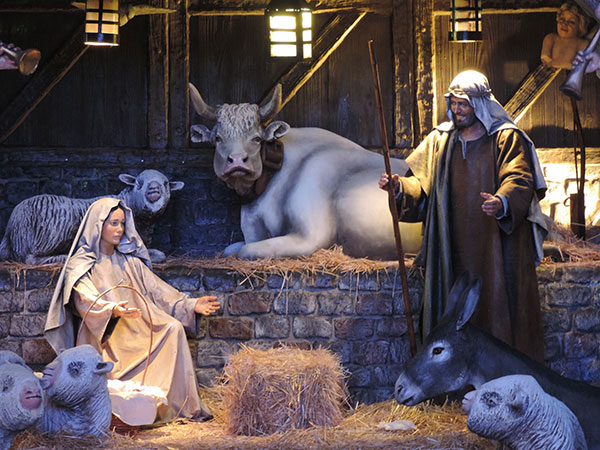Martin Luther is my favorite among the reformers
Oh, then rejoice that through His Son, God is with sinners now at one" - Martin Luther

Oh, then rejoice that through His Son
God is with sinners now at one;
Made like yourselves of flesh and blood,
Your Brother is the eternal God.
—Martin Luther “Vom Himmel kam der Engel Schar” 1543. Trans. Richard Massie
Reflections by Matt Forster, writer and editor at big-words.net
Of all the apostles, I have a particular appreciation for Peter. Like me, Peter is human. If I close my eyes and imagine myself into the narratives of the New Testament, I can’t see myself as the cow-eyed John or the guileless Nathanael. It’s the weak, stumbling Peter that seems right.

Luther wrote Christmas hymns.
Peter—the guy who walks on water, then almost drowns. He’s called “the Rock” by Christ, who later calls him “Satan.” Peter witnesses the transfiguration on the mountain, but can’t keep his eyes open for an hour in the Garden of Gethsemane. He tries to protect the Son of God with a sword—an ill-considered idea from the start—and then denies knowing him three times. Peter is, undeniably and without question, a fallen human being.
For the same reason Martin Luther is my favorite among the reformers. When I read the works of Luther, I see his humanity in all its brilliance and ugliness. On one page he is eloquently defending the faith; later he is vulgar and crass. He can be kind, humorous, or downright racist. In a Christmas sermon he expounds on the need to accept Christ not just as a child borne of a virgin, but as the Savior. Then he rails in his way against the pope and the papists, and also denounces the Turks. Then for good measure, he censures antisacramentarians, fanatics, and sectarians. I can’t imagine his Christmas cards. I am almost certain there would be an image of someone mooning the devil.
It would be nice to gloss over the less attractive bits of Luther’s personality, to recast him in the mold of the stolid Calvin, let’s say. But to fairly edit Luther for polite society would also deny the wit, the humor, and the joy of the man. This joy is seen in his table talks and the hymns he wrote for the church—many of which were sung to common beer hall tunes.
While future reformers would strip their churches of ornament and proscribe the Christmas holiday, Luther felt there was something worthwhile in the community gathering to celebrate the birth of Christ, and several of Luther’s hymns were written for that occasion. That’s where our quote today comes from. It is Luther’s hymn, “Vom Himmel kam der Engel Schar” (“From the Sky Came the Host of Angels”), which we Anglophones know as “To Shepherds, as They Watched at Night.”
Oh, then rejoice that through His Son
God is with sinners now at one;
Made like yourselves of flesh and blood,
Your Brother is the eternal God.
Luther wrote a lot about the cross and justification by faith. In his Christmas hymns, however, he celebrates the language of the incarnation, Christ’s “flesh-and-blood”-ness—Christ as our brother, Christ as God abiding with his creation, Christ whose victory in the flesh will support our weak flesh.
The imagery of God with us in the form of a man is a humbling one, especially in light of the kinds of people we can be—in many ways, Peters and Luthers all. This conviction—that Christ is our brother, that we are God’s own—gives us the strength to be fully ourselves. To try and fail, and try again as we travel the narrow path. It’s the confidence I hear behind Luther’s oft-cited letter to Melanchthon, where wrote, “let your sins be strong, but let your trust in Christ be stronger.”
It’s all set in the faith expressed in the final stanza of “To Shepherds, as They Watched at Night”
Ye shall and must at last prevail;
God’s own ye are, ye cannot fail.
Matt Forster is a writer and editor at big-words.net and a frequent contibutor to Christian History magazine.
(Join us each Thursday for a fresh look at a quote from the Reformation era. Sign up via our e-newsletter (in the box at the right) or through our RSS feed (above), or follow us on Facebook for the next year as we celebrate 500 years of Reformation.)
More on Luther in Christian History magazine issue #115.



